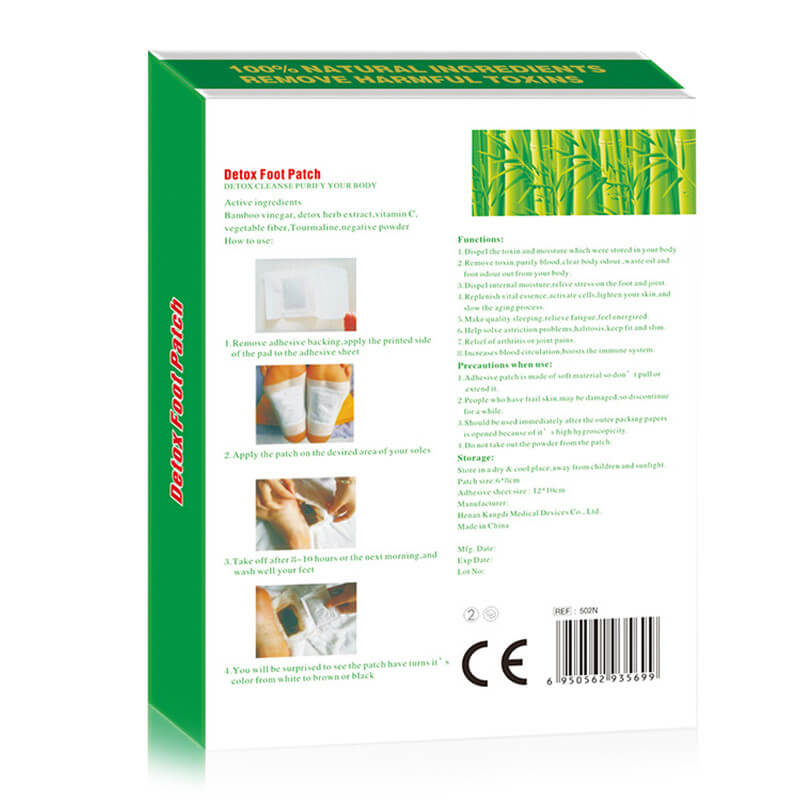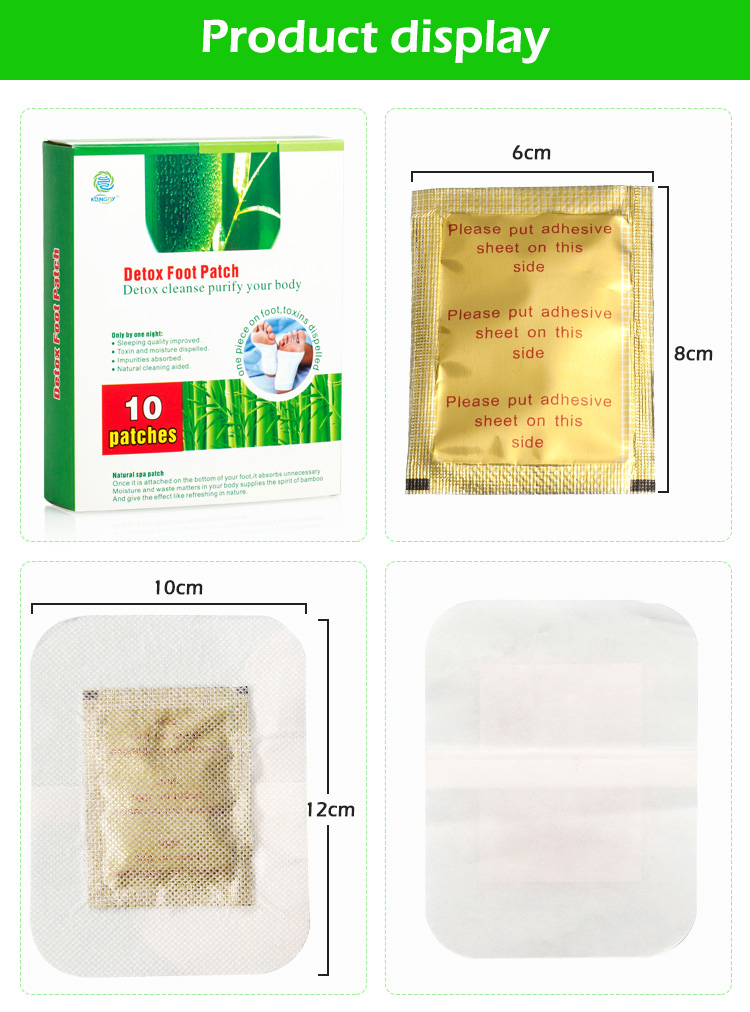What Makes Bamboo Vinegar Foot Patches Sustainable?
As consumers become increasingly eco-conscious, sustainability has emerged as a crucial factor in product selection. Bamboo vinegar foot patches stand out as a sustainable wellness product, offering both health benefits and environmental responsibility. In this article, we will delve into the factors that make bamboo vinegar foot patches sustainable, explore the role of a Bamboo Vinegar Foot Patches Manufacturer and Bamboo Vinegar Foot Patches OEM in promoting eco-friendly practices, and highlight the advantages of choosing Custom Bamboo Vinegar Foot Patches or Private Label Bamboo Vinegar Foot Patches designed with sustainability in mind.

1. Why Sustainability Matters in Foot Patches
A. Growing Consumer Demand
The modern consumer prioritizes environmentally responsible products. Sustainable foot patches not only reduce ecological impact but also appeal to this expanding demographic.
B. Aligning with Global Goals
Many governments and organizations promote sustainable practices to combat climate change and environmental degradation. Partnering with a sustainable Bamboo Vinegar Foot Patches Supplier helps businesses align with these initiatives.
2. Key Features That Make Bamboo Vinegar Foot Patches Sustainable
A. Renewable Raw Material: Bamboo
- Fast Growth: Bamboo is one of the fastest-growing plants, often regenerating without the need for replanting.
- Minimal Resources Required: Bamboo cultivation uses less water and no harmful pesticides, making it an environmentally friendly choice.
- Carbon Absorption: Bamboo absorbs more CO2 than most trees, contributing positively to the environment.
B. Eco-Friendly Manufacturing Processes
A reputable Bamboo Vinegar Foot Patches Manufacturer employs sustainable production techniques, such as:
- Low-Impact Extraction: Extracting bamboo vinegar through pyrolysis minimizes energy use and waste.
- Non-Toxic Formulations: Sustainable patches avoid harmful chemicals, ensuring safety for users and the environment.
C. Biodegradable Materials
- Compostable Components: The patches often feature biodegradable adhesives and natural materials, reducing landfill waste.
- Minimal Packaging: Sustainable packaging uses recyclable or biodegradable materials, further decreasing environmental impact.
D. Reduced Carbon Footprint
- Local Sourcing: Manufacturers that source bamboo locally reduce transportation emissions.
- Efficient Distribution: Sustainable Bamboo Vinegar Foot Patches OEM partners emphasize streamlined logistics to lower carbon output.
3. The Role of Manufacturers and OEMs in Sustainability
A. Bamboo Vinegar Foot Patches Manufacturer Practices
- Energy Efficiency: Manufacturers employing renewable energy sources and energy-efficient machinery reduce their environmental footprint.
- Waste Management: Implementing recycling programs for production waste is crucial.
B. Bamboo Vinegar Foot Patches OEM Contributions
OEMs provide opportunities for brands to:
- Customize for Sustainability: Create Custom Bamboo Vinegar Foot Patches with eco-friendly materials and formulations.
- Private Labeling with a Purpose: Launch Private Label Bamboo Vinegar Foot Patches that highlight sustainability as a core value.
C. Certifications as Indicators
Reliable manufacturers often hold certifications like ISO 14001 (Environmental Management Systems) or FSC (Forest Stewardship Council), proving their commitment to sustainable practices.
4. Benefits of Sustainable Bamboo Vinegar Foot Patches
A. Environmental Protection
By using renewable bamboo and biodegradable materials, sustainable patches reduce ecological harm.
B. Enhanced Brand Reputation
Collaborating with an eco-conscious Bamboo Vinegar Foot Patches Supplier strengthens a brand's position in the market, attracting environmentally aware consumers.
C. Consumer Health and Safety
Eco-friendly products are often free from harmful chemicals, ensuring safer use for consumers.
D. Regulatory Compliance
Sustainable practices help businesses meet global regulatory standards, avoiding penalties and enhancing market accessibility.
5. Tips for Businesses Seeking Sustainable Foot Patches
A. Choose the Right Supplier
Partner with a Bamboo Vinegar Foot Patches Manufacturer that demonstrates a commitment to sustainability through certifications and transparent practices.
B. Opt for Customization
Work with a Bamboo Vinegar Foot Patches OEM to design Custom Bamboo Vinegar Foot Patches tailored to eco-conscious consumers.
C. Promote Sustainability in Marketing
Highlight the eco-friendly aspects of your Private Label Bamboo Vinegar Foot Patches to align with consumer values and drive sales.
Related Questions and Answers
1. What materials make Bamboo Vinegar Foot Patches sustainable?
Sustainable patches use bamboo, a renewable resource, and biodegradable materials for components and packaging.
2. How can I find an eco-conscious Bamboo Vinegar Foot Patches Manufacturer?
Look for manufacturers with certifications like ISO 14001, which indicate sustainable practices, and inquire about their raw material sourcing and waste management policies.
3. Are Custom Bamboo Vinegar Foot Patches more sustainable?
Yes, they can be designed to include eco-friendly materials, formulations, and minimal packaging, aligning with sustainability goals.
4. Why should businesses consider Private Label Bamboo Vinegar Foot Patches?
Private labeling allows businesses to offer unique, sustainable products under their brand, appealing to environmentally conscious consumers.
5. What role does a Bamboo Vinegar Foot Patches OEM play in sustainability?
OEMs enable brands to produce customized, eco-friendly products by incorporating sustainable materials and production methods.
By choosing sustainable Bamboo Vinegar Foot Patches, businesses can contribute to environmental preservation while meeting consumer demands for eco-conscious wellness products. Partnering with the right Bamboo Vinegar Foot Patches Supplier or Bamboo Vinegar Foot Patches OEM ensures that your products not only stand out but also make a positive impact.






